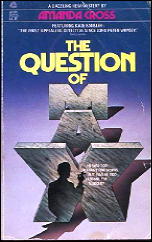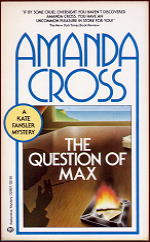Sat 24 Sep 2011
AMANDA CROSS – The Question of Max. Alfred A. Knopf, hardcover, 1976. Paperback reprints include: Avon, 1977; Ballantine, May 1984.

My first experience with a Kate Fansler novel, of which there were 14, with The Question of Max being the fifth. My first reaction (favorable) is that if you like very literary and very quotable (and early feminist) detective fiction, in terms of both the writing and the subject matter, you will like Amanda Cross, or at the least you will like this book.
If, however, your greater pleasure is in terms of solid plotting and following the detective on the case, watching and identifying with her (him) as she goes, why then, we’re on slipperier ground. I was going to explain my unhappiness in greater detail, but after going into the same at great length, I’ve scrapped everything I intended to say and have decided to give you an abbreviated (and less invasive) version instead.
When Max Reston, a literary figure of some small renown, comes calling on Kate at her country refuge in the Berkshires, it is to invite her to drive him to the estate of Cecily Hutchins up in Maine. Max is Cecily’s literary executor, and prowlers have been seen in the vicinity of the manor house where she lived alone after her husband’s death.

Does Max have an ulterior motive? Kate isn’t sure, but she decides to take the request at face value, and takes Max to Maine, where among other things, they find the body of a dead girl in the rocks along the shore not far from Cecily’s home. More amazingly, Kate recognizes the girl as one of her grad students.
Which is where the problem in the plotting first arises. Kate, a university professor of literature, makes a mistake on page 47 that sends her on a false trail for the next 150 pages, a mistake that I don’t think she should have made. I was in academia myself for a good many years, and speaking for myself, I just don’t see it.
It’s a leisurely told tale, and for much of the book it is not even known whether or not a murder has occurred. You may assume there was, as I did, but when it comes down to it, I still rather resent being sent down a path (or a hairpin turn of the plot, metaphorically speaking) as creaky and shaky as this one is.